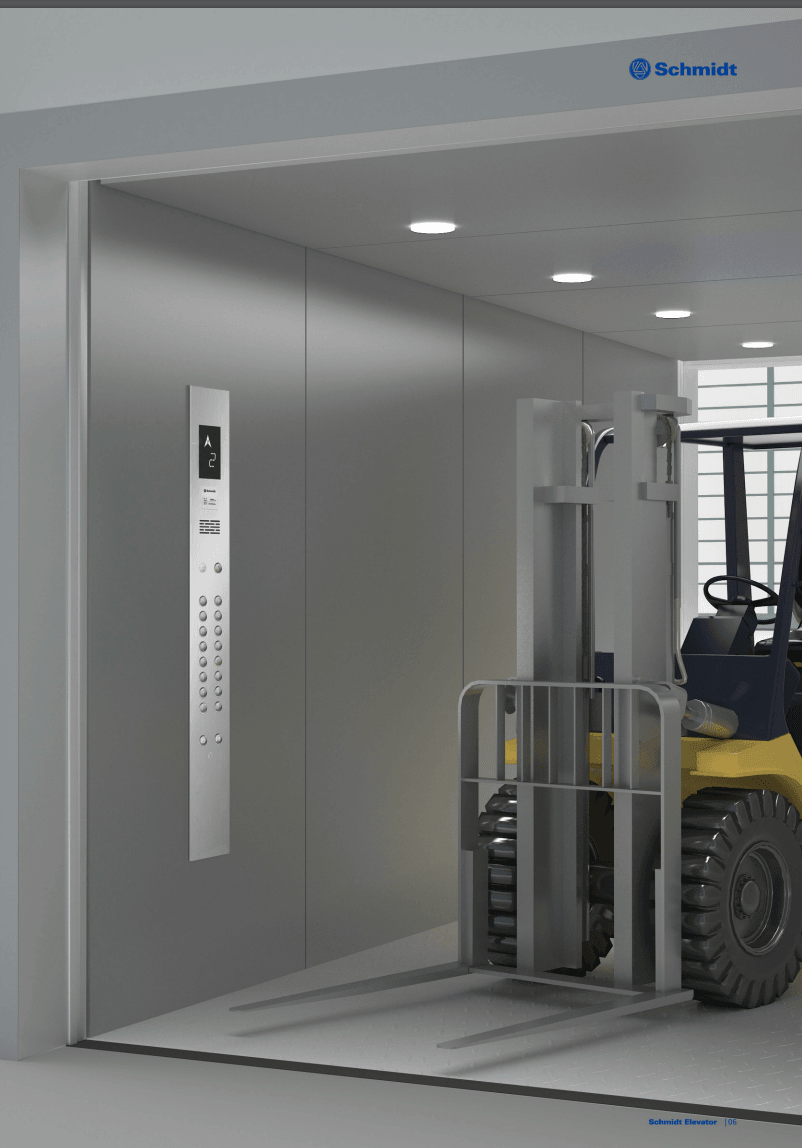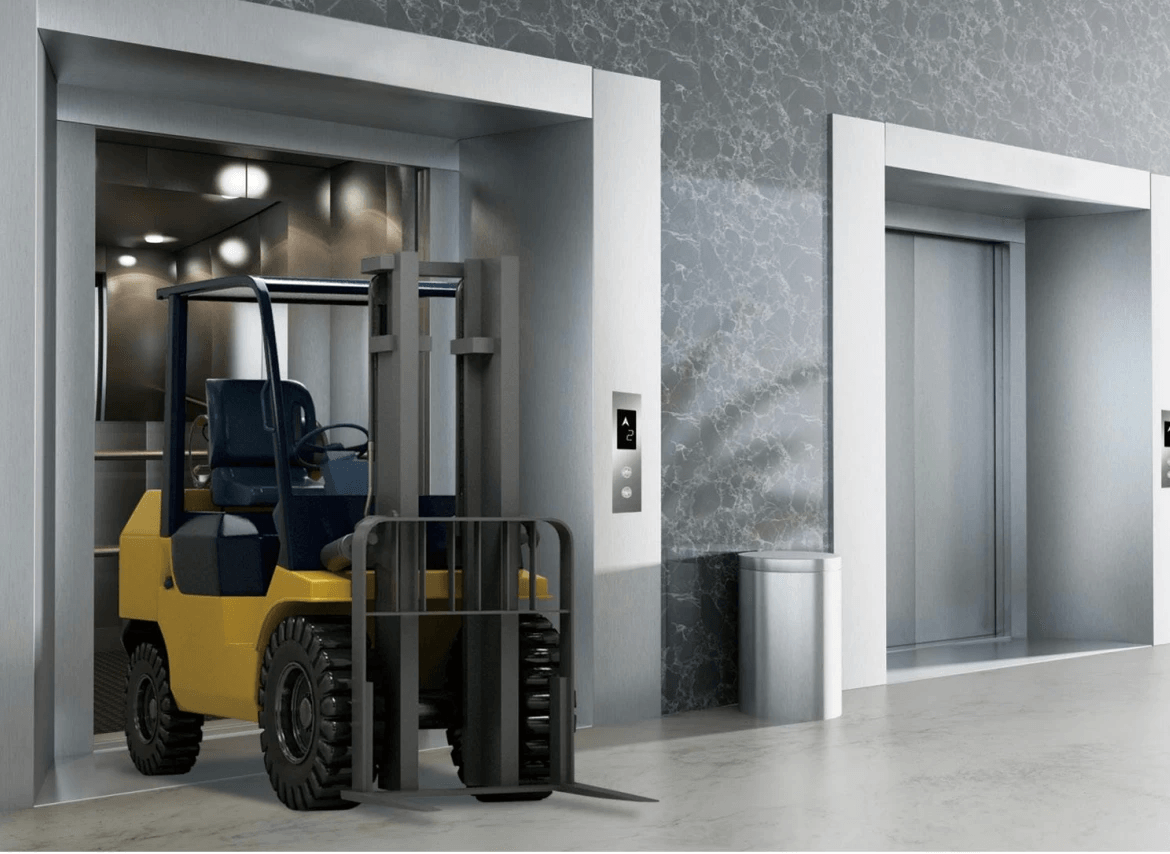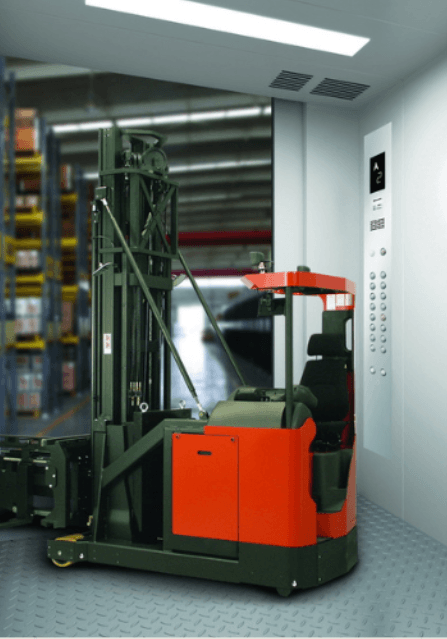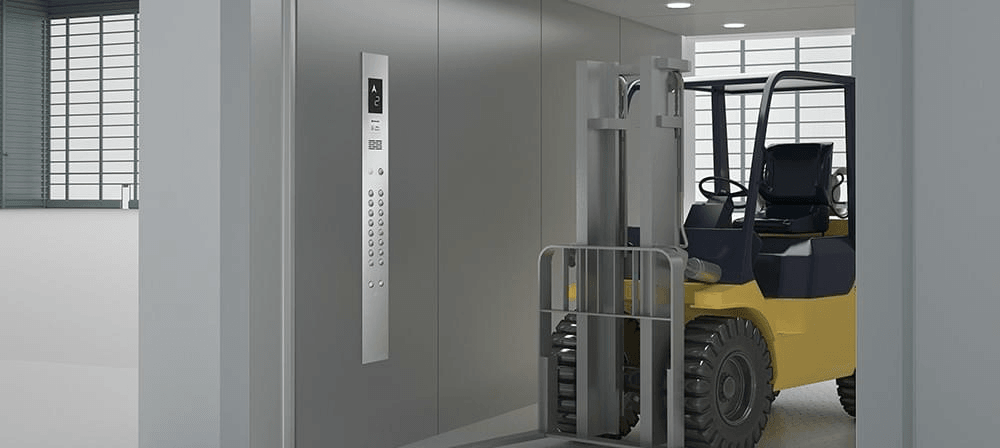Introduction

Freight elevators, also known as cargo elevators, are specialized lifts designed to transport goods rather than passengers. These robust service elevators play a crucial role in various commercial settings, efficiently moving heavy items between floors while ensuring safety and convenience. Understanding what a freight elevator is and its purpose can help businesses optimize their operations and improve overall productivity.
What is a Freight Elevator and Its Purpose
A freight elevator is specifically engineered to handle heavy loads, making it an essential component in industries that require the transportation of large or bulky items. Unlike standard passenger elevators, which are designed with comfort and speed for people in mind, freight elevators prioritize capacity and durability. Their primary purpose is to facilitate the movement of goods in warehouses, factories, retail spaces, and other commercial environments where efficiency is key.
Key Differences: Freight vs Passenger Elevators
The most significant difference between freight and passenger elevators lies in their design and functionality. Freight elevators boast larger dimensions, reinforced flooring, and more powerful lifting mechanisms to accommodate heavy cargo loads safely. While passenger lifts focus on transporting individuals comfortably at higher speeds, service elevators prioritize strength over speed—making them indispensable for businesses that rely on transporting goods regularly.
Benefits of Using Freight Elevators
Utilizing freight elevators brings numerous advantages to commercial operations. Firstly, they enhance efficiency by streamlining the movement of products within a building—reducing manual labor time significantly. Additionally, these cargo elevators improve safety by minimizing the risk of accidents associated with moving heavy items using stairs or smaller lifts; thus ensuring that both employees and goods are well taken care of during transport.
Understanding Freight Elevators

Freight elevators are specialized lifts designed to transport goods and heavy cargo between different levels of a building. Unlike traditional passenger elevators, which cater primarily to individuals, freight elevators prioritize the safe and efficient movement of larger items, making them essential in various commercial settings. So, what is a freight elevator? It’s essentially your go-to service elevator when you need to move more than just people.
What is a Freight Elevator
A freight elevator is a robust type of lift specifically engineered for carrying heavy loads in commercial spaces such as warehouses, factories, and retail establishments. These elevators often feature wider doors and larger cabins compared to standard passenger lifts, allowing them to accommodate bulky items like pallets and machinery with ease. The design focuses on durability and functionality, ensuring that they can handle the demands of transporting cargo safely and efficiently.
How Freight Elevators Operate
Freight elevators operate using similar principles as traditional lifts but are equipped with features tailored for heavy-duty use. They utilize hydraulic or traction systems to move the cab vertically while ensuring stability even under significant weight loads. The operation is usually controlled via large buttons or controls that are accessible from both inside the cabin and at each landing, making it easier for operators to manage the flow of goods efficiently.
Typical Specifications and Features
When considering what makes a freight elevator stand out, several specifications come into play. Typically, these cargo elevators boast higher weight capacities—often ranging from 2,000 pounds up to 10,000 pounds or more—along with spacious interiors designed for easy loading and unloading of goods. Additional features may include reinforced flooring for extra durability, automatic doors for seamless operation, safety brakes for emergency situations, and compliance with local building codes—ensuring that your company elevator meets all necessary regulations while providing reliable service.
Applications of Freight Elevators

Freight elevators, often referred to as cargo elevators, play a crucial role in various industries by facilitating the movement of goods and heavy materials. Unlike traditional passenger lifts and elevators, these robust machines are designed specifically for transporting freight, making them indispensable in settings where efficiency is key. From warehouses to manufacturing plants, understanding how these systems operate can greatly enhance operational workflow.
Common Industries Using Cargo Elevators
Several industries rely heavily on cargo elevators due to their unique capabilities. Warehousing and logistics companies utilize freight elevators to move large quantities of goods between floors efficiently, minimizing manual labor and reducing the risk of injury. Similarly, the retail sector benefits from service elevators to transport heavy inventory from storage areas to sales floors without disrupting customer experience.
In addition to warehousing and retail, freight elevators are essential in manufacturing facilities where heavy machinery parts must be moved quickly and safely between different production levels. Hospitals also employ cargo lifts for transporting medical supplies and equipment between departments while ensuring compliance with safety regulations. Thus, it’s clear that the versatility of freight elevators makes them a staple across various sectors.
Case Study: Schmidt Elevator Co., Ltd.
Schmidt Elevator Co., Ltd. provides an excellent example of a company that has successfully integrated innovative freight elevator solutions into its operations. Specializing in custom-designed lifts and elevators, Schmidt has catered to diverse industries by creating tailored cargo elevator systems that meet specific operational needs. Their commitment to quality service elevator options has earned them a reputation as a leading provider in the market.
One notable project involved outfitting a large distribution center with multiple freight elevators designed for high-volume usage while maintaining energy efficiency standards. By employing advanced technology in their commercial elevator designs, Schmidt was able to streamline operations significantly for their client while ensuring safety features were up-to-date with industry regulations. This case underscores how selecting the right company elevator can lead not only to enhanced productivity but also long-term cost savings.
Innovative Uses in Commercial Spaces
The use of freight elevators extends beyond traditional applications; they are increasingly being integrated into innovative commercial spaces as well. For instance, many modern restaurants utilize service elevators for transporting food supplies discreetly from kitchens located on different floors without interrupting dining experiences or compromising aesthetics. This clever use enhances operational efficiency while keeping customer satisfaction at the forefront.
Choosing the Right Freight Elevator

Selecting the right freight elevator is crucial for ensuring efficient transportation of goods within a commercial space. The decision involves evaluating various factors, such as load capacity, dimensions, and operational efficiency. By understanding these elements, businesses can optimize their logistics and enhance productivity.
Factors to Consider When Selecting
When considering what is a freight elevator for your needs, start with the load capacity; it’s essential to know how much weight the cargo elevator must handle regularly. Additionally, the height and space available for installation will dictate which type of service elevator fits best in your facility. Don’t overlook the frequency of use and potential wear-and-tear; finding an elevator service that offers durability and reliability can save you headaches down the line.
Another key aspect is safety features—make sure your chosen freight elevator complies with local regulations and has essential safety mechanisms like emergency brakes and alarms. The type of materials being transported also plays a role; if you're moving heavy or bulky items, ensure that the design can accommodate them without risk of damage or malfunction. Lastly, consider energy efficiency; modern lifts and elevators come with advanced technology that can reduce operational costs over time.
Types of Freight Elevators Available
Freight elevators come in various shapes and sizes tailored to different industries’ needs. For instance, hydraulic cargo elevators are popular for low-rise buildings due to their smooth operation and lower installation costs. Conversely, traction freight elevators are ideal for taller structures where speed is a priority—perfect for those bustling commercial environments!
Some specialized options include dumbwaiters designed for smaller loads like food or documents, making them perfect additions to restaurants or offices needing efficient vertical transport without taking up much space. Additionally, there are heavy-duty industrial lifts capable of carrying significant weights in warehouses or manufacturing facilities where durability is paramount. Understanding these types will help you choose an option that aligns perfectly with your business requirements.
Notable Elevator Service Providers
Some notable names include Otis Elevator Company and Schindler Group—they’ve been around long enough to know what works best in various settings.
Don’t forget about local providers who may offer personalized services at competitive prices! Local companies often understand regional regulations better than national chains, ensuring compliance from day one while providing quicker response times for maintenance issues—an essential factor when considering ongoing elevator service support! Always ask about customer reviews before making your final choice; satisfied clients speak volumes about reliability.
Installation and Maintenance

When it comes to ensuring the seamless operation of a freight elevator, proper installation and maintenance are key. A well-installed cargo elevator not only enhances efficiency but also ensures safety for all users. Neglecting these aspects can lead to costly repairs and operational downtime, so let’s dive into what you need to know.
The Process of Installing a Freight Elevator
Installing a freight elevator is no small feat; it requires careful planning and execution. First, the site must be evaluated to determine the best location for the service elevator, considering factors like load capacity and building layout. Once the groundwork is laid—literally—the actual installation process involves assembling various components such as the hoist mechanism, control systems, and safety features that make up this vital commercial elevator.
After installation, rigorous testing follows to ensure that everything functions smoothly. This includes checking weight limits and emergency protocols to guarantee compliance with safety standards. Remember, what is a freight elevator without its trustworthy performance? So once it's up and running, you'll want to keep an eye on its operation!
Importance of Regular Elevator Service
Regular elevator service is crucial for maintaining optimal performance in your freight elevator over time. Just like any other machinery, these lifts require routine checks to identify potential issues before they escalate into major problems. By scheduling consistent maintenance with a reliable company specializing in elevators, you can significantly reduce unexpected breakdowns.
Elevator service not only prolongs the lifespan of your cargo elevator but also ensures compliance with local regulations—because nobody wants fines for non-compliance! Regular inspections help keep your operations smooth while adhering to safety standards that protect both goods and personnel alike. So don’t overlook those routine check-ups; they’re an investment in longevity.
Best Practices for Maintenance
To keep your freight elevator running like a well-oiled machine, there are several best practices you should consider implementing regularly. First off, establish a maintenance schedule that includes daily checks by staff who are trained in basic operational procedures—think oiling gears or checking emergency systems!
Additionally, always document any issues or repairs made during each service visit; this creates a valuable history that can inform future maintenance decisions with your chosen company elevator provider. Lastly, consider investing in modern monitoring technology that alerts you when something goes awry—because catching problems early is always better than dealing with them later!
Safety Standards and Regulations

When it comes to freight elevators, safety isn't just a suggestion—it's a requirement. These cargo elevators are designed to transport heavy loads, and ensuring the safety of both the users and the goods being transported is paramount. Understanding the key safety features, compliance with regulations, and the role of elevator companies can help maintain a secure environment in any commercial setting.
Key Safety Features in Freight Elevators
Freight elevators come equipped with several essential safety features that set them apart from standard passenger lifts. For instance, many service elevators have weight sensors that prevent overloading, ensuring that only safe amounts of cargo are transported at any time. Additionally, emergency stop buttons and interlocks on doors help prevent accidents during operation, making freight elevators reliable for heavy-duty use.
Another critical feature is the presence of robust safety brakes designed to halt the elevator's descent in case of power failure or mechanical malfunction. These brakes are often tested rigorously to comply with industry standards, providing peace of mind for operators and users alike. With these safety systems in place, what is a freight elevator becomes not just a transport mechanism but also a secure solution for moving goods efficiently.
Compliance with Local and National Codes
Various regulatory bodies outline specific guidelines that must be followed to ensure public safety while using these commercial elevators. From installation requirements to regular inspections mandated by law, adhering to these codes helps mitigate risks associated with lifting heavy loads.
For example, many jurisdictions require freight elevators to meet specific fire safety standards or accessibility guidelines that apply even in non-passenger contexts. Elevator service providers must be well-versed in these regulations so they can guide companies on how best to comply while maximizing efficiency in their operations. Ignoring these codes can lead not only to legal repercussions but also jeopardize user safety.
Role of Elevator Companies in Safety
Elevator companies play an essential role in maintaining the highest levels of safety for all types of lifts and elevators—including service elevators designed specifically for transporting cargo. These companies are responsible for installing systems correctly according to established standards and conducting routine maintenance checks that ensure everything operates smoothly over time. By prioritizing regular elevator service as part of their offerings, they help clients avoid costly malfunctions or accidents down the line.
Moreover, reputable elevator companies provide training for staff who operate these freight elevators so they understand how to use them safely and effectively—an often overlooked aspect when discussing what is a freight elevator! This training includes understanding emergency procedures as well as recognizing warning signs indicating potential issues before they become serious problems. Ultimately, choosing an experienced company ensures your cargo elevator remains compliant with all necessary regulations while enhancing overall workplace safety.
Conclusion
In summary, the freight elevator is an indispensable component in modern commercial spaces, enabling efficient transportation of goods and materials. As industries continue to evolve, understanding what is a freight elevator becomes crucial for businesses looking to optimize their operations. With advancements in technology, the future of these lifts and elevators promises even greater efficiency and safety features.
The Future of Freight Elevator Technology
The future of freight elevator technology looks bright, with innovations aimed at improving speed, capacity, and energy efficiency. Manufacturers are increasingly integrating smart technologies that allow for remote monitoring and predictive maintenance, ensuring that service elevators operate smoothly with minimal downtime. As businesses demand more from their cargo elevators, we can expect enhanced automation and improved user interfaces that make operation easier than ever before.
Maximizing Efficiency with Modern Elevators
Maximizing efficiency with modern freight elevators involves selecting the right type for your specific needs and ensuring proper installation. Choosing an appropriate commercial elevator can significantly reduce waiting times and increase productivity by allowing seamless movement of goods between floors. Regular elevator service is essential to maintain optimal performance; a well-maintained service elevator will consistently outperform its neglected counterparts.
Choosing the Right Company for Installation and Service
Look for a reputable company that specializes in cargo elevators; they should have a proven track record in both installation and ongoing support through comprehensive elevator service plans. Investing time in selecting a reliable provider not only ensures safety but also maximizes the longevity of your investment.

